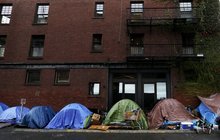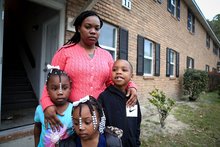0
News Article
Community:
Feb 26, 2019
More than half of students in the U.S. go to segregated or "racially concentrated" schools, according to the report. Those are schools in which more than three-quarters of students are white, or more than three-quarters are nonwhite. Researchers found that high-poverty districts serving mostly students of color receive about $1,600 less per student than the national average. That's while school districts that are predominately white and poor receive about $130 less.
Authored by: Clare Lombardo for NPR
Topics: Education, Funding, Legislation & Policy, Racial inequalities, Research
 Shared by Housing Is
Shared by Housing Is
Housing Is posted a
on Apr 4, 2019
More than half of students in the U.S. go to segregated or "racially concentrated" schools, according to the report. Those are schools in which more than three-quarters of students are white, or more than three-quarters are nonwhite.
0
News Article
Community:
Feb 5, 2019
Building more affordable housing units in the metros that are centers of innovation will increase demand for the wares that fill houses, and increase productivity.
Authored by: Richard Floriday for City Lab
Topics: Asset building, Community development, Housing, Legislation & Policy, Research
 Shared by Housing Is
Shared by Housing Is
Housing Is posted a
on Apr 4, 2019
Richard Floriday for City Lab
Building more affordable housing units in the metros that are centers of innovation will increase demand for the wares that fill houses, and increase productivity.
0
News Article
Community:
Apr 2, 2019
A comprehensive plan would increase King County residents’ confidence in local efforts to address the region’s homelessness crisis, and seeing fewer people living on the streets would prove that it’s working, according to a new poll. Conducted in February by Seattle-based Elway Research, the poll is the latest to explore county residents’ complex feelings about the homelessness crisis and the long-running effort to resolve it.
Authored by: Vernal Coleman for The Seattle Times
Topics: Homelessness, Housing, Legislation & Policy, Low-income
 Shared by Housing Is
Shared by Housing Is
Housing Is posted a
on Apr 4, 2019
Vernal Coleman for The Seattle Times
A comprehensive plan would increase King County residents’ confidence in local efforts to address the region’s homelessness crisis, and seeing fewer people living on the streets would prove that it’s working, according to a new poll.
0
News Article
Community:
Mar 31, 2019
Miami is projected to face anywhere from 1 to 3 feet of sea level rise by 2060, and as sea levels rise, higher ground inland has started to look more and more desirable. Much of that higher ground is in the city's poorest neighborhoods, like Liberty City and Little Haiti. The shifting real estate landscape is just one example of how, in Miami, the effects of global warming are not hypothetical predictions but realities of everyday life, prompting action by government, businesses and individuals alike. Across the region, developers are changing how they build, wealthy homeowners are reinforcing their properties, and in communities that are farther from the coast — places like Liberty City — residents are working to make sure they don't have to leave their homes.
Authored by: Ian Stewart and Lulu Garcia-Navarro for NPR
Topics: Community development, Housing, Legislation & Policy, Low-income, Racial inequalities, South
 Shared by Housing Is
Shared by Housing Is
Housing Is posted a
on Apr 4, 2019
Ian Stewart and Lulu Garcia-Navarro for NPR
Miami is projected to face anywhere from 1 to 3 feet of sea level rise by 2060, and as sea levels rise, higher ground inland has started to look more and more desirable. Much of that higher ground is in the city's poorest neighborhoods, like Liberty City and Little Haiti.
0
News Article
Community:
Apr 2, 2019
A group called the Fostering Stable Housing Opportunities (FSHO) Coalition — which includes Callahan’s youth-led ACTION Ohio and the National Center for Housing and Child Welfare — met in early March with Housing and Urban Development (HUD) Secretary Ben Carson to lay out a plan for a $20 million voucher program aimed at preventing homelessness for transition age foster youth. Under that plan, HUD would use an existing pot of money to provide on-demand vouchers and assistance for foster youth who needed stable housing.” HUD is currently reviewing the proposal to determine the agency’s authority to act on it. If the plan moves forward, it could be a game changer for thousands of teens and young adults who age out of foster care each year.
Authored by: John Kelly for The Chronicle of Social Change
Topics: Child welfare, Foster care, Funding, Housing, Legislation & Policy
 Shared by Housing Is
Shared by Housing Is
Housing Is posted a
on Apr 2, 2019
John Kelly for The Chronicle of Social Change
A group called the Fostering Stable Housing Opportunities (FSHO) Coalition — which includes Callahan’s youth-led ACTION Ohio and the National Center for Housing and Child Welfare — met in early March with Housing and Urban Development (HUD) Secretary Ben Carson to lay out a plan for a $20 million vo
0
News Article
Community:
Mar 28, 2019
The Department of Housing and Urban Development (HUD) on Thursday charged Facebook with discrimination under the Fair Housing Act. HUD says it believes the company was “encouraging, enabling, and causing housing discrimination through the company’s advertising platform.”
Authored by: Matt Novak for Gizmodo
Topics: Housing, Legislation & Policy, Racial inequalities
 Shared by Housing Is
Shared by Housing Is
Housing Is posted a
on Apr 2, 2019
The Department of Housing and Urban Development (HUD) on Thursday charged Facebook with discrimination under the Fair Housing Act. HUD says it believes the company was “encouraging, enabling, and causing housing discrimination through the company’s advertising platform.”
0
News Article
Community:
Mar 20, 2019
Low-income immigrant mothers are skipping the chance to get nutritious foods and help for their infants from a federal program because they fear deportation, or the loss of their children, according to the agencies that distribute those benefits.
Authored by: Alfred Lubrano for The Inquirer
Topics: Child welfare, Early childhood, Food insecurity, Health, Legislation & Policy, Nutrition
 Shared by Mica O'Brien
Shared by Mica O'Brien
Mica O'Brien posted a
on Mar 26, 2019
Alfred Lubrano for The Inquirer
Low-income immigrant mothers are skipping the chance to get nutritious foods and help for their infants from a federal program because they fear deportation, or the loss of their children, according to the agencies that distribute those benefits.
0
News Article
Community:
Mar 21, 2019
Reauthorization of the Healthy Hunger-Free Kids Act of 2010 has been stalled since 2015. Even though the Senate Agriculture Committee and the House Education and the Workforce Committee reported their respective bills, the Improving Child Nutrition Integrity and Access Act of 2016 (S. 3136) and the Improving Child Nutrition and Education Act of 2016 (H.R. 5003), neither was acted upon by the full House and Senate. Instead, these programs were extended as part of the FY2016 omnibus appropriations law.
Authored by: Marshall Matz and Roger Szemraj for AgriPulse
Topics: Child welfare, Food insecurity, Funding, Legislation & Policy, Low-income, Nutrition
 Shared by Mica O'Brien
Shared by Mica O'Brien
Mica O'Brien posted a
on Mar 26, 2019
Marshall Matz and Roger Szemraj for AgriPulse
Reauthorization of the Healthy Hunger-Free Kids Act of 2010 has been stalled since 2015. Even though the Senate Agriculture Committee and the House Education and the Workforce Committee reported their respective bills, the Improving Child Nutrition Integrity and Access Act of 2016 (S.
0
News Article
Community:
Mar 18, 2019
The Department of Education reports more than 29,000 kids in North Carolina were considered homeless in the 2016-2017 school year. About three-quarters of those are living with other families because it’s too expensive to live on their own. According to Shantiqua Neely, it’s not necessarily because people don’t have jobs. She’s the executive director at A Child’s Place, the organization helps homeless CMS students and families. She said it’s because rent is too expensive.
Authored by: Alex Olgin for WFAE 90.7
Topics: Child welfare, Education, Homelessness, Housing, Legislation & Policy, Low-income
 Shared by Mica O'Brien
Shared by Mica O'Brien
Mica O'Brien posted a
on Mar 26, 2019
The Department of Education reports more than 29,000 kids in North Carolina were considered homeless in the 2016-2017 school year. About three-quarters of those are living with other families because it’s too expensive to live on their own.
0
News Article
Community:
Mar 18, 2019
Taller buildings in the hearts of more than two dozen neighborhoods, denser housing on some nearby blocks and requirements that developers help create affordable housing. That’s what Seattle is getting after the City Council voted unanimously Monday to approve some of the most sweeping zoning changes in the city’s recent history.
Authored by: Daniel Beekman for The Seattle Times
Topics: Community development, Housing, Legislation & Policy, Low-income
 Shared by Mica O'Brien
Shared by Mica O'Brien
Mica O'Brien posted a
on Mar 26, 2019
Daniel Beekman for The Seattle Times
Taller buildings in the hearts of more than two dozen neighborhoods, denser housing on some nearby blocks and requirements that developers help create affordable housing.
0
News Article
Community:
Mar 22, 2019
HOME, CDBG, Housing Trust Fund, and other key housing programs are proposed to be cut.
Authored by: Donna Kimura for Affordable Housing Finance
Topics: Funding, Homelessness, Housing, Legislation & Policy
 Shared by Housing Is
Shared by Housing Is
Housing Is posted a
on Mar 26, 2019
Donna Kimura for Affordable Housing Finance
HOME, CDBG, Housing Trust Fund, and other key housing programs are proposed to be cut.
0
News Article
Community:
Mar 12, 2019
The proposed bill follows an NBC News investigation that found at least 11 public housing residents had died of carbon monoxide poisoning since 2003.
Authored by: Suzy Khimm for NBC News
Topics: Funding, Health, Housing, Legislation & Policy, Safety
 Shared by Mica O'Brien
Shared by Mica O'Brien
Mica O'Brien posted a
on Mar 14, 2019
The proposed bill follows an NBC News investigation that found at least 11 public housing residents had died of carbon monoxide poisoning since 2003.
0
News Article
Community:
Mar 11, 2019
The Trump administration released its budget proposal today for fiscal year 2020, and like its previous budget requests for 2017, 2018, and 2019, the administration is proposing steep cuts to both the Department of Housing and Urban Development (HUD) and the Department of Transportation (DoT).
Authored by: Jeff Andrews for Curbed
Topics: Funding, Homelessness, Housing, Legislation & Policy, Transportation
 Shared by Mica O'Brien
Shared by Mica O'Brien
Mica O'Brien posted a
on Mar 14, 2019
The Trump administration released its budget proposal today for fiscal year 2020, and like its previous budget requests for 2017, 2018, and 2019, the administration is proposing steep cuts to both the Department of Housing and Urban Development (HUD) and the Department of Transportation (DoT).
0
News Article
Community:
Feb 25, 2019
Increasing numbers of young Americans are unfit for military service. So why is the Trump administration rolling back nutrition standards?
Authored by: Dan Glickman for Roll Call
Topics: Child welfare, Food insecurity, Legislation & Policy, Nutrition, Obesity
 Shared by Mica O'Brien
Shared by Mica O'Brien
Mica O'Brien posted a
on Mar 12, 2019
Dan Glickman for Roll Call
Increasing numbers of young Americans are unfit for military service. So why is the Trump administration rolling back nutrition standards?
0
News Article
Community:
Mar 7, 2019
Democrats this week announced new legislation that would slash child poverty by paying low-income parents the kind of monthly allowance that is standard in other developed countries. But the lawmakers who introduced the bill, called the American Family Act, didn’t use the terms “child benefit” or “child allowance” at their Capitol Hill press conference Wednesday. Instead, they all called it a tax credit or a tax cut.
Authored by: Arthur Delaney for HuffPost
Topics: Child welfare, Dual-generation, Early childhood, Funding, Legislation & Policy, Low-income, Research
 Shared by Housing Is
Shared by Housing Is
Housing Is posted a
on Mar 12, 2019
Arthur Delaney for HuffPost
Democrats this week announced new legislation that would slash child poverty by paying low-income parents the kind of monthly allowance that is standard in other developed countries.
0
News Article
Community:
Feb 28, 2019
Child poverty in the U.S. could be cut in half over the next 10 years with a few simple steps, according to a new report from the National Academies of Sciences, Engineering and Medicine. The cost would be high — at least $90 billion a year. But the National Academies report warns that the price of not doing anything would be far greater.
Authored by: Pam Fessler for NPR
Topics: Child welfare, Criminal justice, Early childhood, Education, Food insecurity, Funding, Health, Immigrants, Legislation & Policy, Low-income, Nutrition, Racial inequalities
 Shared by Housing Is
Shared by Housing Is
Housing Is posted a
on Mar 12, 2019
Child poverty in the U.S. could be cut in half over the next 10 years with a few simple steps, according to a new report from the National Academies of Sciences, Engineering and Medicine. The cost would be high — at least $90 billion a year.
0
News Article
Community:
Feb 5, 2019
We beef up law enforcement to attack crime, devote more funding to try and improve inadequate schools and tackle health disparities by getting more people to the doctor. But what if Baltimore could solve all of its persistent social problems by getting rid of poverty?
Authored by: Baltimore Sun Editorial Board for The Baltimore Sun
Topics: Asset building, Criminal justice, Funding, Health, Legislation & Policy, Low-income, Mental health
 Shared by Housing Is
Shared by Housing Is
Housing Is posted a
on Mar 11, 2019
Baltimore Sun Editorial Board for The Baltimore Sun
We beef up law enforcement to attack crime, devote more funding to try and improve inadequate schools and tackle health disparities by getting more people to the doctor. But what if Baltimore could solve all of its persistent social problems by getting rid of poverty?
0
News Article
Community:
Mar 11, 2019
The housing crisis has given rise to acronyms which define the battle over new developments: "Yes in My Backyard" (YIMBYs) vs. “Not In My Backyard" (NIMBYs). And now there's a new acronym: PHIMBY, as in "Public Housing in My Backyard."
Authored by: Jessica Placzek for KQED
Topics: Community development, Housing, Legislation & Policy, West Coast
 Shared by Housing Is
Shared by Housing Is
Housing Is posted a
on Mar 11, 2019
The housing crisis has given rise to acronyms which define the battle over new developments: "Yes in My Backyard" (YIMBYs) vs. “Not In My Backyard" (NIMBYs). And now there's a new acronym: PHIMBY, as in "Public Housing in My Backyard."
0
News Article
Community:
Feb 28, 2019
Over the past decade, the real estate fortunes for African Americans have reversed course. Despite a strengthening economy, including record low unemployment and higher wages for black workers, homeownership levels for that group have dropped incrementally almost every year since 2004. It fell to 43 percent in 2017, virtually erasing all of the gains made since the passage of the Fair Housing Act in 1968, landmark legislation outlawing housing discrimination.
Authored by: Troy McMullen for The Washington Post
Topics: Asset building, Community development, Housing, Legislation & Policy, Racial inequalities
 Shared by Housing Is
Shared by Housing Is
Housing Is posted a
on Mar 11, 2019
Troy McMullen for The Washington Post
Over the past decade, the real estate fortunes for African Americans have reversed course. Despite a strengthening economy, including record low unemployment and higher wages for black workers, homeownership levels for that group have dropped incrementally almost every year since 2004.
0
News Article
Community:
Mar 6, 2019
Fort Worth’s work finding housing solutions for those facing homelessness can serve as a model for the rest of the country, Housing and Urban Development Secretary Ben Carson said Wednesday during a stop in Cowtown, one of several planned in Texas.
Authored by: Luke Ranker for Fort Worth Star-Telegram
Topics: Funding, Homelessness, Housing, Legislation & Policy, Low-income, Partnerships, South
 Shared by Housing Is
Shared by Housing Is
Housing Is posted a
on Mar 11, 2019
Luke Ranker for Fort Worth Star-Telegram
Fort Worth’s work finding housing solutions for those facing homelessness can serve as a model for the rest of the country, Housing and Urban Development Secretary Ben Carson said Wednesday during a stop in Cowtown, one of several planned in Texas.
0
News Article
Community:
Mar 1, 2019
Residents of a South Carolina public housing complex are demanding answers after two of their neighbors died from the gas.
Authored by: Suzy Khimm and Laura Strickler for NBC News
Topics: Housing, Legislation & Policy, Low-income, Safety
 Shared by Mica O'Brien
Shared by Mica O'Brien
Mica O'Brien posted a
on Mar 7, 2019
Suzy Khimm and Laura Strickler for NBC News
Residents of a South Carolina public housing complex are demanding answers after two of their neighbors died from the gas.
0
News Article
Community:
Mar 5, 2019
If rent-control measures pass in all of the states and cities where they're currently on the table, nearly a third of all renter households in the United States could secure relief.
Authored by: Sophie Kasakove for Pacific Standard
Topics: Housing, Legislation & Policy
 Shared by Mica O'Brien
Shared by Mica O'Brien
Mica O'Brien posted a
on Mar 7, 2019
Sophie Kasakove for Pacific Standard
If rent-control measures pass in all of the states and cities where they're currently on the table, nearly a third of all renter households in the United States could secure relief.
0
News Article
Community:
Mar 5, 2019
Disasters are becoming more common in America. In the early and mid-20th century, fewer than 20 percent of U.S. counties experienced a disaster each year. Today, it's about 50 percent. According to the 2018 National Climate Assessment, climate change is already driving more severe droughts, floods and wildfires in the U.S. And those disasters are expensive. The federal government spends billions of dollars annually helping communities rebuild and prevent future damage. But an NPR investigation has found that across the country, white Americans and those with more wealth often receive more federal dollars after a disaster than do minorities and those with less wealth. Federal aid isn't necessarily allocated to those who need it most; it's allocated according to cost-benefit calculations meant to minimize taxpayer risk.
Authored by: Rebecca Hersher and Robert Benincasa for NPR
Topics: Community development, Funding, Housing, Legislation & Policy, Low-income, Racial inequalities, Research, Stability
 Shared by Mica O'Brien
Shared by Mica O'Brien
Mica O'Brien posted a
on Mar 7, 2019
Rebecca Hersher and Robert Benincasa for NPR
Disasters are becoming more common in America. In the early and mid-20th century, fewer than 20 percent of U.S. counties experienced a disaster each year. Today, it's about 50 percent.
0
News Article
Community:
Mar 5, 2019
In a recently published report called “A Roadmap to Reducing Child Poverty” from the National Academies of Sciences, Engineering and Medicine, its co-authors suggest policy changes that they claim could cut child poverty in half in just 10 years.
Authored by: Rhonda Fanning and Michael Marks for Texas Standard
Topics: Child welfare, Health, Legislation & Policy, Low-income
 Shared by Housing Is
Shared by Housing Is
Housing Is posted a
on Mar 7, 2019
Rhonda Fanning and Michael Marks for Texas Standard
In a recently published report called “A Roadmap to Reducing Child Poverty” from the National Academies of Sciences, Engineering and Medicine, its co-authors suggest policy changes that they claim could cut child poverty in half in just 10 years.
0
News Article
Community:
Feb 22, 2019
The grants provided under Assembly Bill 4702 aim to help colleges address hunger statewide, leverage more sustainable solutions to address basic food needs on campus, raise awareness for available food services, and continue to build strategic partnerships at the local, state and national levels to address food insecurity among students.
Authored by: NJBiz
Topics: Education, Food insecurity, Funding, Legislation & Policy, Nutrition, Post-secondary, Youth
 Shared by Housing Is
Shared by Housing Is
Housing Is posted a
on Mar 4, 2019
The grants provided under Assembly Bill 4702 aim to help colleges address hunger statewide, leverage more sustainable solutions to address basic food needs on campus, raise awareness for available food services, and continue to build strategic partnerships at the local, state and national levels to


 Shared by Housing Is
on Apr 4, 2019
Shared by Housing Is
on Apr 4, 2019


 Shared by Housing Is
on Apr 4, 2019
Shared by Housing Is
on Apr 4, 2019


 Shared by Housing Is
on Apr 4, 2019
Shared by Housing Is
on Apr 4, 2019


 Shared by Housing Is
on Apr 4, 2019
Shared by Housing Is
on Apr 4, 2019


 Shared by Housing Is
on Apr 2, 2019
Shared by Housing Is
on Apr 2, 2019

 Shared by Housing Is
on Apr 2, 2019
Shared by Housing Is
on Apr 2, 2019






 Shared by Housing Is
on Mar 26, 2019
Shared by Housing Is
on Mar 26, 2019




 Shared by Housing Is
on Mar 12, 2019
Shared by Housing Is
on Mar 12, 2019
 Shared by Housing Is
on Mar 12, 2019
Shared by Housing Is
on Mar 12, 2019

 Shared by Housing Is
on Mar 11, 2019
Shared by Housing Is
on Mar 11, 2019


 Shared by Housing Is
on Mar 11, 2019
Shared by Housing Is
on Mar 11, 2019

 Shared by Housing Is
on Mar 11, 2019
Shared by Housing Is
on Mar 11, 2019
 Shared by Housing Is
on Mar 11, 2019
Shared by Housing Is
on Mar 11, 2019





 Shared by Housing Is
on Mar 7, 2019
Shared by Housing Is
on Mar 7, 2019

 Shared by Housing Is
on Mar 4, 2019
Shared by Housing Is
on Mar 4, 2019